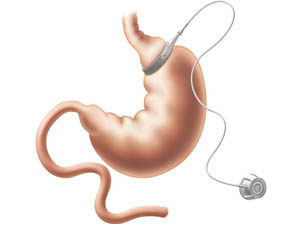Gastric Band Indications
Gastric Band surgery is generally suitable for people: whose body mass Index above 40, or those who are 99 pounds or more over their ideal weight, or those between 35 to 40 with co-morbidities, such as arthritis, sleep apnea, diabetes, and high blood pressure, which should well improve with weight loss; People aged between 18 and 55 years (although some patients as young as 12 have received successful results); People who have a general failure of weight loss or dietary drug therapy for over a year; People who have exhibited a history of obesity for 5 years or more; People who understand the risks and benefits of the procedure and exhibit a willingness to comply with the considerable lifelong commitment to dietary restrictions which are required required for long term success, and; People who are willing to accept the operative risk.
It is usually contraindicated for people: If the surgery or treatment represents an unacceptable risk to the patient; If the patient has an untreated diseases of the endocrine system, such as hypothyroidism; If the patient has inflammatory diseases of the gastrointestinal tract such as Crohn's disease, esophagitis, or ulcers; If the patient has severe cardiopulmonary disease; If the patient has been shown to have allergic reactions to some of the materials that may be contained with in the band; If the patient has exhibited an intolerance of pain to implanted devices; If the patient has a dependency on alcohol or drugs; If the patient has a severe learning or cognitive disabilities or emotionally unstable people, or; If the patient has or other conditions which generally make them poor surgical candidates. It should be noted that B vitamin and Iron deficiencies are routinely reported by gastric bypass patients. Poor bone health is also a risk if you don't get adequate amounts of calcium. Gastric Band patients often have trouble eating lamb,pork, beef, and sometimes poultry after surgery. Like enriched cereals, pastas, and rice, these foods all contain iron which are usually not tolerated after surgery. This lost iron can be replaced easily with correctly formulated bariatric supplements.
The benefits of gastric banding as compared to other bariatric surgeries are numerous and include: Reduced mortality rate (approximately 1 out of 2000); The surgery is completely reversible: There is no cutting or stapling of the stomach; The surgery requires only a short hospital stay; The surgery has a rapid recovery; The Gastric Band is fully adjustable without additional surgery; Malabsorption issues are nonexistent since the intestines are not bypassed, and; The surgery represents less life threatening complications than the alternatives may offer. Following surgery, sensitive and correct adjustment of the band is necessary for weight loss and the long term success of the procedure. Adjustments may be performed with or without the use of an X-ray. No completely accurate number of adjustments required is known. However, an average may be estimated to be between three and five for the patient to obtain optimum weight loss. The normal gastric banding patient loses 1 to 2 pounds weekly, but heavier patients often lose quicker in the beginning. It is important to note that while most patients drop the weight faster in the beginning, some studies have found patients will have the same percentage of excess weight loss and comparable ability to keep it off after only a couple of years.

